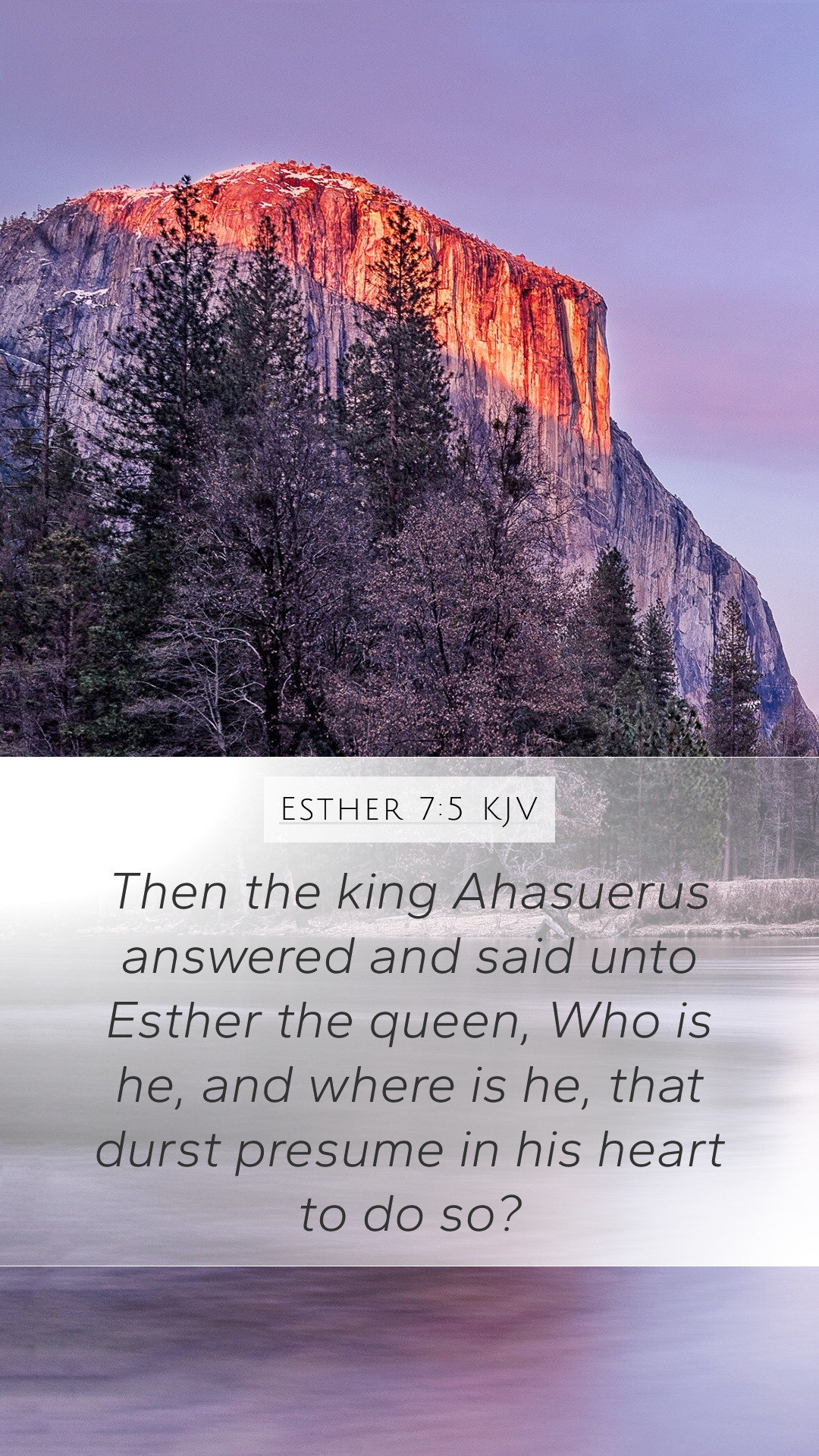Old Testament
Genesis Exodus Leviticus Numbers Deuteronomy Joshua Judges Ruth 1 Samuel 2 Samuel 1 Kings 2 Kings 1 Chronicles 2 Chronicles Ezra Nehemiah Esther Job Psalms Proverbs Ecclesiastes Song of Solomon Isaiah Jeremiah Lamentations Ezekiel Daniel Hosea Joel Amos Obadiah Jonah Micah Nahum Habakkuk Zephaniah Haggai Zechariah MalachiEsther 7:5 Meaning
What is the meaning of Esther 7:5?
Then the king Ahasuerus answered and said unto Esther the queen, Who is he, and where is he, that durst presume in his heart to do so?
Esther 7:5 Bible Verse Meaning
Understanding Esther 7:5
Bible Verse: Esther 7:5 - "Then King Ahasuerus said to Esther, 'What is your petition, Queen Esther? It shall be granted you. And what is your request? Up to half of my kingdom, it shall be done!'"
Overview
In this pivotal moment of the Book of Esther, we see a significant turning point where Esther reveals her true identity and the peril that threatens her people, the Jews. This verse captures the immediate reaction of King Ahasuerus, showing not only his authority but also his willingness to listen to Esther's pleas.
Commentary Insights
- Matthew Henry: Henry emphasizes the courage of Esther in laying bare her request before the king. He notes that the king’s inquiry reveals both his fondness for Esther and the urgency of her mission. The promise to grant her request underscores the king's power and Esther's favored status.
- Albert Barnes: Barnes points out the significance of the royal decree. The phrase "up to half of my kingdom" illustrates the generosity often extended in ancient courts, yet it sets the stage for the gravity of Esther's forthcoming revelation about Haman’s plot against her people.
- Adam Clarke: Clarke highlights the symbolic meaning of the king’s question. He interprets Ahasuerus's willingness to grant requests as a common royal demeanor that often masks deeper political intrigues or personal relationships, showcasing the tension in the narrative as Esther prepares to unveil the danger facing the Jews.
Detailed Analysis
As we dive deeper into this verse, we can explore several key aspects:
- Royal Authority: Ahasuerus embodies the theme of authority in Esther. His ability to grant requests symbolizes the overlordship and the precariousness of power dynamics within the Persian court.
- Context of the Request: Understanding the cultural context is critical. Esther is a Jewish woman in a position of influence within a foreign court, which magnifies the stakes of her request. Her boldness reflects a daring reliance on divine providence.
- Women of Influence: This moment is pivotal for conveying how women can exert influence in historical narratives steeped in patriarchal systems, demonstrating Esther's formidable strength and courage.
Application of This Verse
This verse invites readers to reflect on the importance of advocacy and bravery in the face of adversity. Esther's confidence in approaching the king offers lessons on seeking assistance and interceding for others in desperate times. The implications of her courage serve as an inspiration for modern believers navigating their own challenges.
Related Bible Cross References
- Esther 4:14: Esther is encouraged by Mordecai, reminding her of her unique position.
- Proverbs 21:1: Illustrating that the heart of kings is in the hands of the Lord.
- James 1:5: Encouragement to seek wisdom from God in all matters.
Conclusion
Esther 7:5 is a powerful assertion of trust in God's providence and the resulting courage needed to confront dire situations. Through studying this verse and its surrounding context, we deepen our understanding of Scripture and open our hearts to applying these lessons in our lives.
Further Study
The study of Esther provides rich insights into themes such as divine intervention, the role of women in scripture, and the nature of leadership. For those looking for bible study insights and bible study guides, this passage serves as a foundational reference point for discussions about faith, courage, and identity.


